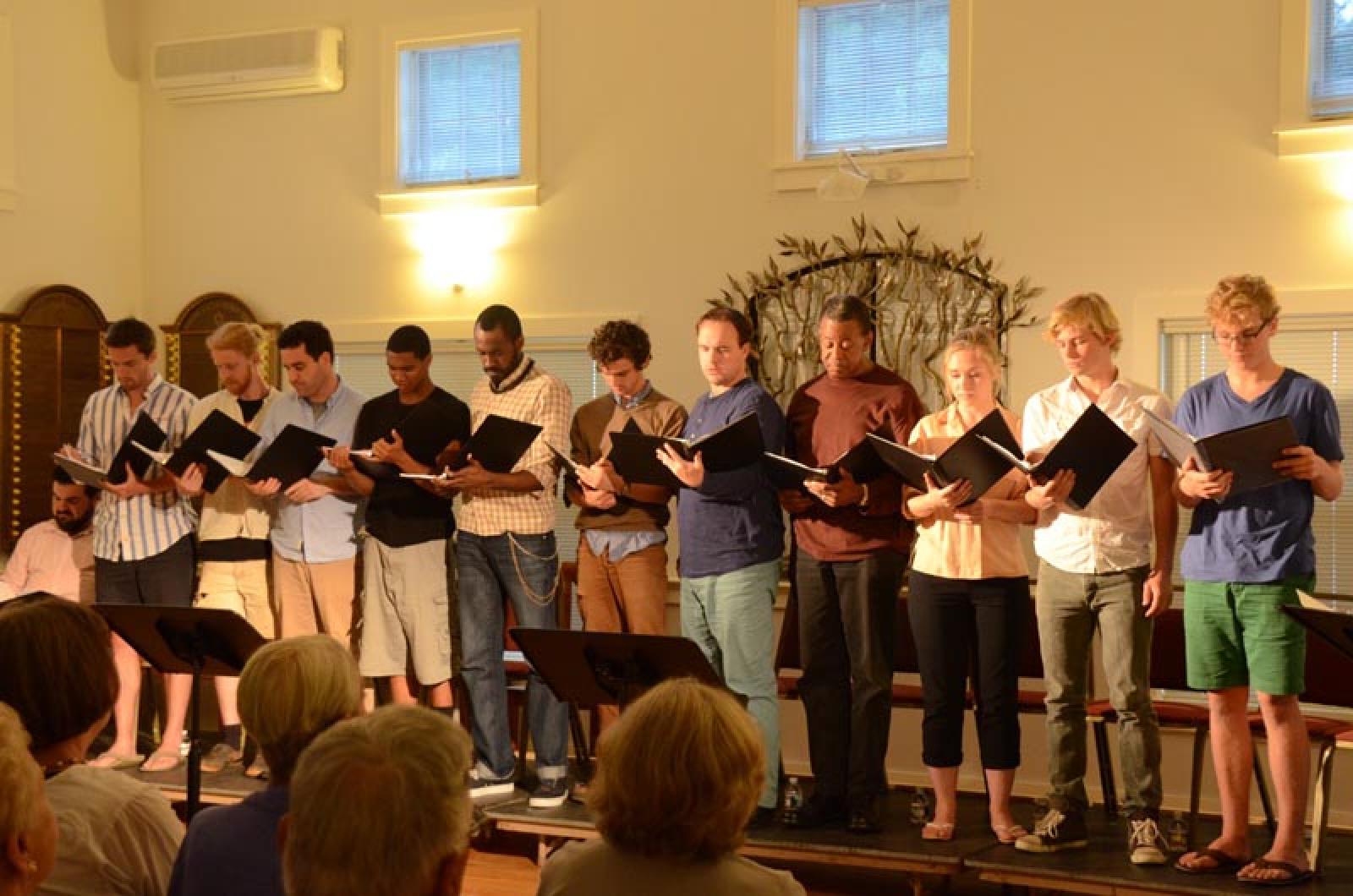“People ask me how will you get a boat on stage? What I like to say is — theatrical imagination.”
With these words, Joe Forbrich introduced a reading of his new play, The Whaleship Essex, on Monday, July 22. The staged reading was part of The Vineyard Playhouse’s Monday Night Specials series. It was performed by a group of 16 actors and actresses, two from New York and 14 from Martha’s Vineyard.
Together, under the direction of Peter Zinn, this group told the true story of the whaling ship that sailed out of Nantucket and was sunk by an enraged sperm whale on November 20, 1820. The script’s vivid imagery and the traditional sea shanties engaged the audience to such a degree that when a familiar song began, some audience members joined in on the chorus.
The lure of the ocean is something Mr. Forbrich is intimately familiar with. In 2008, after he read Wooden Boats: In Pursuit of the Perfect Craft at an American Boatyard, which is a story about the Vineyard’s own Gannon & Benjamin Marine Railway, Mr. Forbrich set out to build a wooden boat. Then, still enthralled by the boatyard, he contacted Nat Benjamin and offered to work for him. Mr. Benjamin accepted.
During this time Mr. Forbrich, a longtime actor, discovered The Vineyard Playhouse, auditioned for a show, got the part, and sailed his 16-foot boat from Long Island to Martha’s Vineyard. He spent what he refers to as the best summer of his life working at the boatyard during the day and at the theatre at night.
In his script for The Whaleship Essex, Mr. Forbrich draws on the common language of sailing, carpentry and the theatre: ropes, pulleys, boards and battens. He was inspired to write the play after he read In the Heart of the Sea: The Tragedy of the Whaleship Essex by Nathaniel Philbrick. Mr. Forbrich decided to dig deeper into the firsthand accounts of some of the ship’s survivors, the first mate and cabin boy. He said that a series of questions, inspired by this true story, repeated themselves in his mind: “Why were these men forced to cannibalize each other...? What did whale oil mean to the world with the onset of the industrial revolution? What is it about our centuries-long thirst for oil? Did these men pay for America’s thirst by suffering a terrible thirst all their own?”
The parallels between the whalers’ quest for oil from the sea and today’s quest for oil from the ground are drawn sharply by the character’s reflections. Nickerson, the ship’s cabin boy says, “men shall ever die in service of a thirst.” And the ship’s captain reflects, “Two wars have been fought for oil, undoubtedly there will be more.”
When Mr. Forbrich eventually creates the set for the play — the reading did not have a set — the antique and the modern will continue to share common ground. The ship itself will be suspended off the stage with the springs and shocks from a car.
Recounting the original inspirations for this play, Mr. Forbrich said, “Another powerful image was the idea of the ship’s captain finally making it back to Nantucket after a 90-day ordeal in an open boat, only to have to inform his aunt of the horrid fate of her son. Which task was more difficult? How did it change him for the rest of his life?”
The relationship between the captain and his cousin is developed throughout the script and the terrible moment of the cousin’s death and cannibalization by the other surviving crew members is a turning point for the audience, the scene reverberating with the questions Mr. Forbrich had asked himself during the writing of the script: “How far will man go to survive?” and “Why does the world seem to wreak such a poetic horror on certain events?”
At the end of the story the audience hears from the voices of the surviving crew members, including the captain and the cabin boy. The cabin boy, as young as he is, speaks with a poetic truthfulness.
“In the bitterest of ironies, the savage was in us. We feared what we would all become and then we became what we’d feared.”









Comments (1)
Comments
Comment policy »